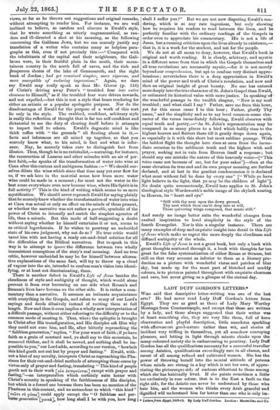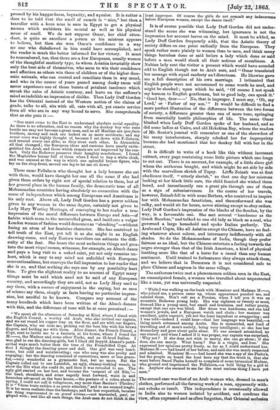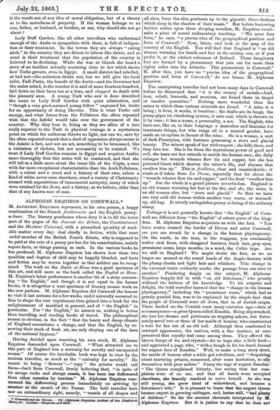LADY DUFF GORDON'S LETTERS.*
WHO said that descriptive letter-writing was one of the lost arts? He had never read Lady Duff Gordon's letters from Egypt. They are as good as those of Lady Mary Wortley Montagu from Constantinople, and except that these are written by a lady, and those always suggested that their writer was at heart something else, they are very like them, full of keen observation and playful description, little anecdotes sparkling with effervescent good-nature rather than wit, and stories of incident very trifling in themselves, yet all somehow conveying pleasure, and letting in light through minute chinks upon the many-coloured society she is endeavouring to pourtray. Lady Duff Gordon has all the qualifications necessary for a successful traveller among Asiatics, qualification exceedingly rare in all classes, and rarest of all among refined and cultivated women. She has the power of throwing herself into the mental attitude of persons whose minds are strung in a key which is not her own, of appre- ciating the picturesque side of customs abhorrent to those among which shelas habitually lived. If she paints sometimes a little too exclusively in rose colour, that is in the East a fault on the right side, for the Asiatic can never be understood by those who hate him, and the woman who thinks every Arab graceful and dignified will understand him far better than one who is only im- * Letters from Egypt,186845. By Lady Duff Gordon Loulou: Ilsonsalaa. sad Co.
pressed by his haggardness, 'opacity, and squalor. It is rather a dose to be told that the smell of camels is " nice," but then a traveller with a keen nose is sure in Egypt to get a physical nausea which embitters his mental as well as his physical sense of smell. We do not suppose Omar, her chief atten- dant, is quite so excellent a person as his mistress appears to believe, but then she won Omar's confidence in a way no one who disbelieved in him could have accomplished, and the reader is much the better informed for her victory. It must be remembered, too, that there are a few Europeans, usually women of the thoughtful motherly type, to whom Asiatics invariably show only the beat side of themselves, who seem to win their confidence and affection as others win those of children or of the higher dom- estic animals, who can control and conciliate them in any mood, and who in the course of years passed among dusky races will never experience one of those bursts of petulant insolence which streak the calm of Asiatic courtesy, and leave on the sufferer's mind so indelible an impression of dislike. Then Lady Duff Gordon has the Oriental instead of the Western notion of the claims of grade, talks to all, sits with all, eats with all, yet exacts service from all who are in any way bound to serve. She comprehends that as she puts it :—
"One must coma to the East to understand absolute social equality. As there is no education, and no reason why the donkey boy who runs beside me may not become a great man, and as all Muslims are ipso facto brothers, money and rank are looked on as mere accidents; and my savoir vivre was highly thought of, because I sat down with Mahan; and treated every one alike, as they treat each other. In Alexandria all that changed ; the European ideas and customs have nearly extin- guished the Arab, and those which remain are not improved by the con- tact. Only the Bedawee preserve their haughty nonchalance. I found the Maghrabee bazaar full of them when I went to buy a white cloak, and was amused at the way in which one splendid bronze figure, who lay on the shop front, moved one leg to let me sit down."
Those same Fellahesn who thought her a lady because she sat with them, would have thought her one all the same if she had given them orders by right not of special relation to them, but of her general place in the human family, the democratic tone of all Mohammedan countries having absolutely no connection with the sense of independence which among Europeans and Americans is its only root. Above all, Lady Duff Gordon has a power seldom given to any woman in the same degree, certainly not given to Lady Mary Wortley Montagu, of conveying to her reader a true impression of the moral difference between Europe and Asia—of habits which seem to the nntravelled gross, and incidents a vulgar London woman of fashion would denounce as "shocking"—without losing an atom of her feminine character. She has contrived to tell truth of the East, yet tell it as she might in an English drawing-room, and only Eastern travellers can estimate the diffi- culty of the feat. She hears the most audacious things and goes. into the most risque scenes, witnesses, for example, an Almeh dance and pays a long visit to a naked saint, yet not only remains un- hurt, which is easy to any mind not enfeebled with European conventionalisms, but conveys the full impression to her reader that she is so, and that nothing she says can by any possibility hart him. To give the slightest reality to an account of Egypt many things insist be said which need not be said of any European country, and accordingly they are said, not as Lady Mary used to say them, with a nuance of enjoyment in the saying, but as men of science say them, simply as facts leaving no particular impres- sion, but needful to be known. Compare any account of the many hundreds which have been written of the Almeh dances with this, and the difference of tone will be at once perceived : — " We spent all the afternoon of Saturday at King, where I dined with the English Consul, a worthy old Arab, who also invited our captain, and we sat round his copper tray on the floor, and ate with our fingers, the Captain, who sat next me, picking out the best bits with his brown gagers, and feeding one with them. After dinner, the French Consul, a Copt, sent to invite me to a fantasia at his house, where I found the 11—s, the Mudeer and some other Turks, and an ill-bred Italian. I was glad to see the dancing-girls, but I liked old Seyyid Alimad's patri- archal ways much better than the tone of the Frenchified Copt. At first I thought the dancing queer and dull. One girl was very hand- some, but cold and uninteresting; one who sang was also pretty and engaging ; but the dancing consisted of contortions, more or less grace- ful,—very wonderful as a gymnastic feat, bat no more. But the Captain called oat to one Lateefeh, an ugly, clumsy-looking wench, to show the Sitt what she could do, and then it was revealed to me. The ugly girl started on her feet, and became the 'serpent of old Nile,'— the head, shoulders, and arms eagerly bent forward, waist in and haunches advanced on the bent knees,—the posture of a cobra about to spring. I could not call it voluptuous, any more than Racine's 'Phtdre;' it is Vdnus touts entiere il sa proie attachee," and to me seemed tragic. It is far more realistic than the fandango, and far less coquettish, because the thing represented is au grand serieux,—not travestied, gaze, or played with ; and like all such things, the Arab men do not think it the
least improper. Of course the girls do not commit any indecorums before European women, except the dance itself."
It is of course possible that Lady Duff Gordon did not under- stand the scene she was witnessing, but ignorance is not the impression her account leaves on the mind. It must be added, as
Lady Duff Gordon frequently adds, that the Asiatic theory of society differs on one point radically from the European. They
speak rather more plainly to women than to men, and think many things harmless done or said before a lady which done or said before a man would shock all their notions of seemliness. A Nubian lady sent the visitor a present which would have sounded odd to English though not to Arab ears, and " Omar translated her message with equal modesty and directness. He likewise gave
me a full description of his own marriage. I intimated that English people were not accustomed to some words he used, and might be shocked ; upon which he said, Of course I not speak my hareem to English gentleman, but to good lady, can speak it.'
Good bye, dear--' No, that is improper, I must say, ' Oh, my Lord,' or Father of my son." It would be difficult to find a more perfect illustration of the difference between the two forms of society, a difference greater than one of mere tone, springing from essentially hostile philosophies of life. The same Omar blushed when Lady Duff Gordon spoke of her husband, and so did some ladies at Cairo, and old Hekekian Bey, whom the readers of Mr. Senior's journal will remember as one of the shrewdest of his many interlocutors, sharply rebuked her for impropriety because she had mentioned that her donkey fell with her in the street.
It is difficult to write of a book like this without incessant extract, every page containing some little picture which one longs to cut out. There is an account, for example, of a little slave girl whom the authoress bought, and which might be set side by side with the marvellous sketch of Topsy. Little Zeinab was at first obedience itself, " utterly slavish," so that one day her mistress looking at her black little ears, the child fancied she wished them bored, and incontinently ran a great pin through one of them as a sign of submissiveness. In the course of her travels, however, Zeinab fell in with some Berbers, who contrived to inspire her with Mohammedan fanaticism, and thenceforward she was sulky, and would sit for hours, never stirring except to obey orders. Lady Duff Gordon's impression of the blacks of the Soudan, by the way, is a favourable one. She met several "handsome as the. Greek Bacchus," and talked to one old lady as black as a coal, who governed a large household and spoke Italian perfectly. The Arabs and Copts, like all Asiatics except the Chinese, have no feel- ing whatever about colour, and intermarry indifferently with all shades. So do the Mohammedans of India, though they prefer fairness as an ideal, but the Chinese entertain a feeling towards the negro stronger than that of the Irish American, a kind of physical loathing more like that of a horse for a camel than any human sentiment. Until trained to forbearance they always attack them, and we believe that in Demerara it is not considered safe to place Chinese and negroes in the same village.
The authoress twice met a phenomenon seldom seen in the East, an emancipated female, a woman who travelled about unprotected like a man, yet was universally respected.
" While I was walking on the bank with Monsieur and Madame M—, who joined me, a person came up, whose appearance puzzled me, and saluted them. Don't call me a Persian, when I tell you it was an eccentric Bedawee young lady. She was eighteen or twenty at most, dressed like a young man, but small and feminine, and rather pretty, except that one eye was blind. Her dress was handsome, and she had women's jewels, and a European watch and chain ; her manner was excellent, quite ungenirt, yft not the least impudent or swaggering ; and I was told—indeed I could hear—that her language was beautiful,—a thing much esteemed among Arabs. She is unmarried, and fond of travelling and of men's society, being very intelligent; so she has her dromedary and goes about quite alone. No one seemed astonished, no one stared ; and when I asked if it was proper, oar captain was surprised, Why not? If she does not wish to marry, she can go alone ; if she does, she can marry. What harm? She is a virgin, and free.' She expressed her opinions pretty freely, as far as I could understand her. Madame M—had heard of her before, and said she was much respected and admired. Monsieur — had heard she was a spy of the Pasha's, but the people on board the boat here say that the truth is, that she went before Saeed Pasha herself to complain of some tyrannical Mudeer, who ground and imprisoned the FeIlalaeen,—a bold thing for a girl to do. Anyhow she seemed to me far the most curious thing I have yet seen."
The second case was that of an Arab woman who, dressed in man's clothes, performed all the farming work of a man, apparently with- out rebuke or insult. This independence is occasionally allowed in India also to women isolated by accident, and confirms the view, often expressed and as often forgotten, that Oriental seclusion is the result not of any idea of moral obligation, but of a theory as to the sacredness of property. If the woman belongs to no one, father, or husband, or brother, or son, why- should she not go about ?
Lady Duff Gordon, like all other travellers who understand enough of the Arabs to sympathize with them, is full of indigna- tion at their treatment. In the towns they are always " eating stick," in the country they are driven to labour like slaves, and so cruel is their treatment that the population of the country is believed to be declining. While she was at Girzeh she heard a story of an incident actually occurring close to her which shows how Turks govern, even in Egypt. A small district had rebelled, or had not—the authoress thinks not, but we will give the local ruler, Fadl Pasha, the benefit of the doubt—and the Governor had the males seized, to the number it is said of some fourteen hundred, laid down on their faces ten at a time, and chopped to death with the pioneers' axes. A young Turk who saw it done described the scene to Lady Duff Gordon with quiet admiration, and " though a very good-natured young fellow " expressed his desire for an opportunity of doing likewise. This is what Turks call energy, and what forces from the Fellaheen the often repeated wish that the Infidel would take over the government of the country. Why they bear it, being as they are allies of a race really superior to the Turk in physical courage, is a mysterious point on which the authoress throws no light, nor can we, save by the often repeated remark that a deed of oppression always seems to the Asiatic a fact, and not an act, something to be bemoaned, like a visitation of cholera, but not necessarily to be resisted. We trust if Lady Duff Gordon remains in Egypt and acquires Arabic more thoroughly that this series will be continued, and that she will tell us a little more about the inner life of the Copts, a race with far more exceptional characteristics than the Arab Fellaheen, with a colour and a creed and a history of their own, colour a kind of white never seen elsewhere, creed a variety of Christianity crossed with superstitions of immemorial antiquity, many of which were retained by the Jews, and a history, as we believe, older than that of any known race of men.
































 Previous page
Previous page